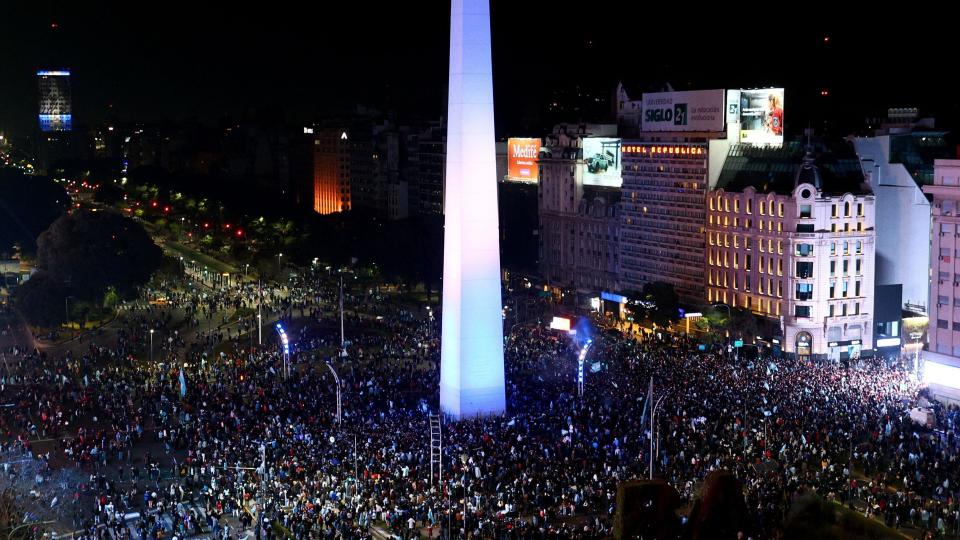Argentina won the Copa América, but lost the respect of many for the way they celebrated.
Midfielder Enzo Fernández faces disciplinary proceedings at Chelsea after posting a video on social media that the French Football Federation said included alleged “racist and discriminatory language”.
FIFA is also investigating the video, in which several members of the Argentina national team – celebrating their 1-0 victory over Colombia in the final – take part in a song originally sung by Argentine fans questioning the heritage of France’s black and mixed-race players.
The global repercussion of this song provoked a reaction from the Argentine government.
Javier Milei’s right-wing administration has no natural sympathy for anything that could be considered “woke.”
But Julio Garro, undersecretary of Sports, suggested that team captain Lionel Messi and local FA president Claudio Tapia apologize for the song some sang on the bus on Sunday night. “It made us feel bad,” he said.
Others, however, rejected the need for an apology.
With monotonous and depressing regularity, when teams from Argentina face opponents from Brazil in continental club competitions, there are scenes in the stands of Argentine fans making monkey gestures.
When interviewed, the perpetrators vehemently deny that they are racist. They are indulging in ‘jokes’. All is fair, they argue, in love, war and football. Anything that incites and angers the opposition is fair game. And on this last subject, these feelings are widespread.
Attempts by Argentine clubs to suppress this behavior have often been timid, with references to “xenophobia” – instead of calling it what it really is: racism.
Especially depressing is the fact that this behavior was exhibited by some of the players. There is no excuse here.
With the exception of one of the substitute goalkeepers, the entire squad is based in Europe.
These players are part of multinational, multicultural and multiracial teams. They should know much better. In addition to possible sanctions, there could be some very awkward moments in the locker room as they return to pre-season training.


Why do they do this?
One of the attractions of the national team for these players is the opportunity to be together with people from their own culture and sing their own songs.
It’s a chance for them to be Argentines in an aggressive and assertive way.
Many aspects of the country’s fan culture are wonderful. The songs can be hypnotic.
But the lyrics of this particular song, which arose from the World Cup final in Qatar, won by Argentina on penalties against France, are extremely disturbing.
Argentine players risk not only insulting their black teammates and fans. These songs insult their own heritage.
It’s rare these days to see a black Argentine. But it was not always so.
Dating back to the days of Spanish colonial rule, the country imported far fewer enslaved Africans than neighboring Brazil and ended slavery decades earlier. But about two hundred years ago, Buenos Aires was a black third.


What happened to this population?
There are many theories, ranging from outbreaks of yellow fever to deaths in the war for independence.
The most coherent idea, however, is simply that they were flooded by millions of immigrants from Europe and the Middle East (especially Italy – Argentines speak Spanish with Italian intonation) at the end of the 19th century and the beginning of the 20th century.
The African influence is present in the genetic heritage. Dark-skinned people are often nicknamed “el negro” – which does not carry any negative connotations.
African influence left its mark. Argentina’s most significant cultural product is tango. The word is African, and the music and dance, like so many genres in the Americas, are a consequence of the mixture of African, European and indigenous styles.
Due to its socially humble origins, tango was despised by the Argentine elite, seen as a vulgar phenomenon – until it took Paris by storm at the beginning of the 20th century and was thus legitimized.
In fact, it is interesting that (just like samba in Brazil), tango in Argentina moved in the opposite direction to football. The musical genre started at the bottom of society and worked its way up, where football started with the elites and worked its way down.
A friend of mine is a black Uruguayan sociologist.
One would expect him to have a good radar for these things, and he lived in Buenos Aires for years without having the slightest problem.
On the other hand, the mere presence of so many European immigrants in the southern cone of South America was an explicitly racist project.
At the time, there was a vogue for eugenic ideas – the belief that some “races” were superior to others.
South American leaders sought to “improve” and “civilize” their countries by importing a white workforce.
The very presence, then, of so many European descendants in Argentina is a consequence of racist thinking.
The idea of a hierarchy of races never completely disappeared and appeared in all its horror in the lyrics of the song with which some Argentine players tarnished their glory on Sunday.
































